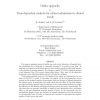Free Online Productivity Tools
i2Speak
i2Symbol
i2OCR
iTex2Img
iWeb2Print
iWeb2Shot
i2Type
iPdf2Split
iPdf2Merge
i2Bopomofo
i2Arabic
i2Style
i2Image
i2PDF
iLatex2Rtf
Sci2ools
122
click to vote
ANOR
2010
2010
Time-dependent analysis for refused admissions in clinical wards
For capacity planning issues in health care, such as the allocation of hospital beds, the admissions rate of patients is commonly assumed to be constant over time. In addition to the purely random fluctuations, there is also typically a predictable pattern in the number of arriving patients. For example, roughly 2/3 of the admitted patients at an Intensive Care Unit arrives during office hours. Also, most of the scheduled admissions occur during weekdays instead of during the weekend. Using approximations based on the infinite-server queue and simulations, we analyze an Mt/H/s/s model to determine the impact of the time-dependent arrival pattern on the required number of operational beds and fraction of refused admissions for clinical wards. In particular, the results show that the effect of the daily pattern is rather limited for clinical wards in contrast to the week-weekend pattern, for which the difference in the fraction of refused admissions across the week is considerable. We a...
| Added | 08 Dec 2010 |
| Updated | 08 Dec 2010 |
| Type | Journal |
| Year | 2010 |
| Where | ANOR |
| Authors | René Bekker, A. M. de Bruin |
Comments (0)

